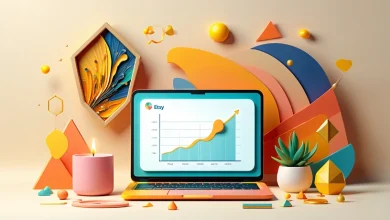How to Implement the Etsy Latest SEO Changes

Etsy Pedia: Etsy changed…. Again. learn how to implement Etsy’s New Title Guidelines – Your Blueprint to AI Search Dominance and Sale Protection
Decode Etsy’s new title guidelines now to future-proof your shop, avoid the deadly “keyword stuffing” traps, and align with personalized AI search feeds before your competitors do.
Listen to the Podcast
TL;DR: The Urgency of Personalized Action
Etsy’s latest title updates are not suggestions-they are a mandatory shift to an AI-driven future. The old strategy of keyword stuffing is a guaranteed path to being invisible. The biggest threat to your sales isn’t competition; it’s making the wrong change to a successful listing.
You need a precise, expert plan to know what to fix, what to leave alone, and what not to do to protect your revenue. Don’t risk your income on guesswork. Our Etsy Store Audit Service provides the full, customized roadmap and action plan to improve your entire shop with the new algorithm changes. Click here now to get the peace of mind you deserve and secure your future sales!
The Deadline is Now: Why Old Etsy Titles Are a Liability
For years, the motto on Etsy was “more keywords, more visibility.” This led to messy, unreadable titles that worked only because the search engine was basic. Today, AI search algorithms (like the ones driving Etsy’s feed and Google’s SGE) demand clarity, intent, and customer experience. Etsy’s August/September 2025 guidelines are their direct answer, pushing for shorter, clearer, and customer-friendly titles.
The High Cost of Hesitation: Why You Can’t Afford to Guess
Most sellers are terrified of touching their listings because they fear losing hard-earned ranking and sales history. This fear is valid! A single wrong keyword removal can destroy a listing’s performance. But ignoring the update ensures your low-performing listings stay exactly where they are-unseen. You need a trusted expert to tell you with certainty: “Touch this, but do not touch that.”
Stop the paralyzing fear! Our Etsy Listing Audit provides a targeted, personalized diagnostic for your single most challenging listing. Get the exact step-by-step instructions on what to change to maximize visibility and sales
The New Blueprint: Mastering What to Include and Remove
Your title is no longer a keyword collection; it’s a product definition.
What to Include: The New Rules of Clarity
- A Clear, Simple Noun (First!): The title must begin by stating exactly what the item is. This instant clarity is what AI craves.
- Example: Start with “Mug,” “Dress,” or “Ring,” not a long descriptive phrase.
- Key Objective Descriptors: Immediately follow the noun with the top 2-3 essential facts: material, size, color, or primary function.
- Example: “Mug – Black Ceramic – 15 oz.”
- Essential Occasion Keywords: Only use occasion or recipient keywords if the product is built for it.
- Action: “Halloween Costume” is essential; “Gift for Mom” is not.
Key Takeaway (In a Nutshell): Noun first, facts second. If it’s not a fact about the product’s identity, it doesn’t belong.
What to Remove: Deleting the Sales Killers
These items clutter your title, offer minimal SEO benefit, and belong elsewhere in your listing.
- Subjective Descriptions: Words like “beautiful” or “perfect” are subjective. Move them to your description to enhance the sales copy.
- Keyword Repetition: Avoid repeating words (“unisex adult poncho, unisex cotton poncho”). The algorithm gets it.
- Action: Use your 13 tags for variations. Need to find better keywords fast? Check out ETShop.ai – Unlock the exact keywords your competitors are using!
- Sales or Shipping Details: “On sale” or “free shipping” are automatically displayed by Etsy’s badging system. Remove them immediately.
- Aspirational Phrases: Gifting terms (“gift for him,” “anniversary present”) must move to your tags and attributes.
Key Takeaway (In a Nutshell): Delete adjectives, repetitive phrases, and terms Etsy already displays. Your title’s only job is clear product identification.
Your Strategic Action Plan: Protect and Improve
- Protect Your Cash Cow Listings (Do Nothing)
Rule #1: If a listing is performing well, do NOT change the title. Etsy is not penalizing old titles that convert well. The proven conversion history is more valuable than perfect title formatting.
- Test Smartly on Underperforming Listings
Use your weakest listings as a test lab. Change 5-10 low-view listings to the new short format and track their performance for 30 days.
How do you accurately identify the weak links without expert analysis? If you want to eliminate all doubt and get a hyper-focused corrective strategy for your underachievers, the Etsy PRO SEO Guide provides a targeted prescription – Click Here
- Move Keywords to the Real Powerhouse: Tags and Attributes
Keywords removed from your titles are NOT wasted-they belong in your tags and attributes, which are the main engines for long-tail search and filtering.
- Tags: Use all 13 tags strategically for recipient, style, occasion, and material variations. Need help finding those high-converting long-tail tags? Start your FREE EverBee trial and discover the keyword goldmine!
- Descriptions: Ensure the first 160 characters of your description naturally incorporate your main keywords to maintain strong Google SEO ranking. You can use great visuals to stand out on social media and drive external traffic using a tool like Placeit for creating amazing product mockups!
Key Takeaway (In a Nutshell): Preserve your winners, test on your losers, and immediately re-home all removed keywords into your tags. This entire strategy is covered in our Organic Promotion on Etsy category.
Final Decision: Control Your Future or Risk Your Revenue
The 2025 Etsy title updates are a non-negotiable step toward modernizing your business. By prioritizing clarity and strategically repositioning your keywords, you align yourself with the future of commerce.
Your choice is simple: Guess and pray, or invest in a guaranteed, personalized solution that eliminates risk.
- For a Full-Shop Guarantee: If you need a comprehensive, long-term plan to ensure every aspect of your shop-titles, tags, descriptions, and shop policies-is optimized for AI search, buy the Etsy Store Audit Service. Invest in your future: Get the full audit and stop leaving money on the table!
- For Quick, Targeted Wins: If you want to test the new guidelines and fix your most stubborn underperforming item for immediate results, buy the Etsy Listing Audit.
If you are just starting and want to build perfect habits from day one, open a new Etsy shop and get 40 free listings!
Frequently Asked Questions (FAQ)
Will I be penalized if I don’t rewrite my old Etsy titles?
No, but you will be disadvantaged! Etsy confirmed they are not penalizing old successful titles. However, the new, clearer titles are favored in new searches and AI feeds. Your old titles simply won’t be seen as much over time. To guarantee your strongest listings are fully optimized, only a personalized audit can provide that certainty. Get a targeted Listing Audit now and ensure your top products stay visible!
Where should I put my keywords about “gifts” and “occasions”?
Place all gift, recipient, style, and occasion keywords into your 13 available tags and the listing’s attributes. These sections are critical for long-tail search. For a full breakdown of the best place for every keyword, grab our comprehensive Premium SEO Guide – Master your tags and attributes today!
Should I use the new AI tool provided by Etsy?
Use the AI tool as a suggestion engine, not a final editor. Always review and apply your judgment. The AI can help streamline work, but it lacks the human intent that drives conversions. If you want a strategy to drive traffic outside of Etsy to reduce reliance on the algorithm, check out the Etsy Organic Traffic with Pinterest Guide!
Which audit service should I buy to fix my title issues?
If you are overwhelmed and need a complete strategic overhaul of your entire shop to ensure everything is perfect, buy the Etsy Store Audit Service. If you only want to focus on fixing a few titles for quick results, buy the Etsy Listing Audit for a deep dive into individual performance.




